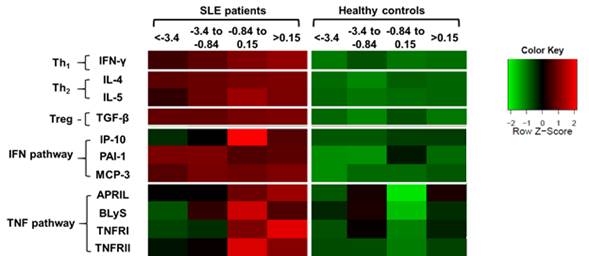Session Information
Session Type: Abstract Submissions (ACR)
Background/Purpose Systemic Lupus Erythematosus (SLE) is a clinically diverse autoimmune disease that often begins with a pre-disease period of autoantibody production and symptom accrual. Identifying reliable and biologically relevant predictors for future SLE onset could contribute to understanding disease pathogenesis, discovering disease-specific targetable pathways and facilitating prevention of this debilitating disorder.
Methods To assess potential mechanistic pathways dysregulated early in lupus autoimmunity and to identify serum biomarkers that can accurately forecast SLE development, we measured 13 autoantibodies and 34 circulating soluble mediators including cytokines, chemokines, and soluble receptors in serially collected serum samples from time points before and after meeting ACR classification in 55 individuals who subsequently developed SLE and 60 matched healthy controls.
Results Elevated IL-4 (median, 13.9 vs 2.67 pg/mL), IL-5 (median, 51.14 vs 11.18 pg/mL), and IFN-γ levels (median, 9.12 vs 0.81 pg/mL) are present in subsequent SLE patient sera long before the disease classification (≥3.4 years) [compared to the healthy controls, p<0.05]. Path analysis shows that the elevation of IL-4 and IL-5 likely precede development of the majority of lupus specific autospecificities. Random forest modeling during the preclinical period identified IFN-γ (Th1), IL-4 (Th2), and IL-5 (Th2) as reliable predictors of future SLE onset of SLE with only a 3.27% out of bag (OOB) prediction error. The best set of predictive biomarkers at/after disease classification includes IFN-γ, IL-4, IL-5 MCP-3, and TGF-β (3.68% OOB classification error).
Conclusion These results suggest that dysfunctional Th2 related pathways likely potentiate autoantibody production during the pre-clinical period and abnormal elevations in Th1 cytokine levels exacerbate immune dysregulation. This longitudinal case-control retrospective study has not only provided a panel of SLE predictors to help develop prevention strategies, but strengthened the hypothesis that dysregulated Th1 and Th2 pathways are involved in early SLE pathogenesis.
Disclosure:
R. Lu,
None;
M. E. Munroe,
None;
J. M. Guthridge,
None;
K. M. Bean,
None;
D. Fife,
None;
J. B. Harley,
None;
J. A. James,
None;
M. P. Keith,
None.
« Back to 2014 ACR/ARHP Annual Meeting
ACR Meeting Abstracts - https://acrabstracts.org/abstract/ifn-%ce%b3-th1-il4-th2-and-il5-th2-are-elevated-in-pre-clinical-sle-and-predict-transition-to-classified-disease-prior-to-appearance-of-autoantibodies-or-clinical-criteria/

